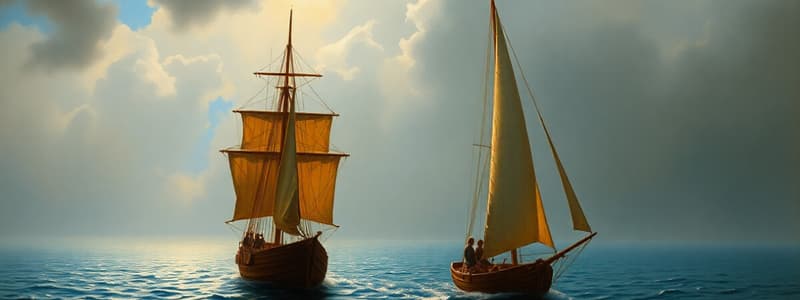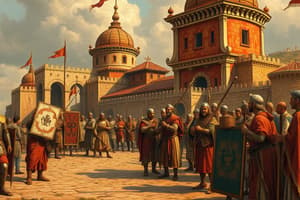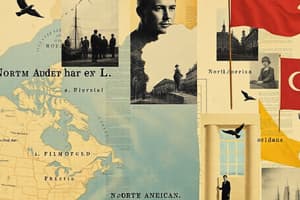Podcast
Questions and Answers
What was a significant outcome of European exploration in the early 1400s?
What was a significant outcome of European exploration in the early 1400s?
- A lack of interest in overseas territories.
- Permanent changes in global interactions. (correct)
- Exclusively military conquests in Africa.
- An era of isolation between Europe and Asia.
Which of the following was NOT a motivation for European exploration?
Which of the following was NOT a motivation for European exploration?
- Desire for new trade routes.
- Quest for wealth and resources.
- Drive to spread Christianity.
- Interest in artistic expression. (correct)
What crucial technological advancement facilitated European exploration?
What crucial technological advancement facilitated European exploration?
- The creation of more accurate maps.
- Developments in shipbuilding. (correct)
- Improvements in navigation systems.
- The invention of the compass.
Which figure is associated with the early trade routes to Asia in the 1200s?
Which figure is associated with the early trade routes to Asia in the 1200s?
What phrase best summarizes the motivations of Europeans for exploration?
What phrase best summarizes the motivations of Europeans for exploration?
Which of the following best describes the scope of European interest in foreign lands before 1400?
Which of the following best describes the scope of European interest in foreign lands before 1400?
What was the primary aim of European merchants during their explorations?
What was the primary aim of European merchants during their explorations?
Who was the Portuguese explorer that first reached the Cape of Good Hope?
Who was the Portuguese explorer that first reached the Cape of Good Hope?
The term 'crusaders' in the context of European exploration refers to which of the following?
The term 'crusaders' in the context of European exploration refers to which of the following?
Which institution was instrumental in promoting overseas exploration during the Renaissance?
Which institution was instrumental in promoting overseas exploration during the Renaissance?
Which of the following was NOT a motive for European exploration according to Bartolomeu Dias?
Which of the following was NOT a motive for European exploration according to Bartolomeu Dias?
What phrase summarizes the primary motives for exploration expressed in the content?
What phrase summarizes the primary motives for exploration expressed in the content?
What technological advancement was crucial for long-distance ocean voyages during the 1200s?
What technological advancement was crucial for long-distance ocean voyages during the 1200s?
What was one of the expected outcomes of European exploration aside from acquiring wealth?
What was one of the expected outcomes of European exploration aside from acquiring wealth?
Which explorer's quote is mentioned in the content regarding the motives for exploration?
Which explorer's quote is mentioned in the content regarding the motives for exploration?
Which of the following motivations reflects a desire beyond material wealth in the context of exploration?
Which of the following motivations reflects a desire beyond material wealth in the context of exploration?
How did advances in technology specifically affect European sea exploration?
How did advances in technology specifically affect European sea exploration?
What was one of the primary goods Europeans sought from Asia?
What was one of the primary goods Europeans sought from Asia?
Which of the following statements about the motives of exploration is true?
Which of the following statements about the motives of exploration is true?
What challenge did European sea captains face prior to technological advancements in the 1200s?
What challenge did European sea captains face prior to technological advancements in the 1200s?
What was a significant impact of the Crusades on European trade?
What was a significant impact of the Crusades on European trade?
Why were merchants able to charge high prices for spices in Europe?
Why were merchants able to charge high prices for spices in Europe?
Who controlled the trade routes that brought Asian goods to Europe?
Who controlled the trade routes that brought Asian goods to Europe?
What was a primary reason European monarchs sought to bypass Italian merchants?
What was a primary reason European monarchs sought to bypass Italian merchants?
What motivated European exploration during the Age of Exploration?
What motivated European exploration during the Age of Exploration?
What effect did the Italian merchants have on the spice trade?
What effect did the Italian merchants have on the spice trade?
Which spice was NOT mentioned as being in high demand in Europe?
Which spice was NOT mentioned as being in high demand in Europe?
The introduction of Asian spices into Europe had what impact on European cuisine?
The introduction of Asian spices into Europe had what impact on European cuisine?
How did the end of the Crusades influence European attitudes towards Muslims?
How did the end of the Crusades influence European attitudes towards Muslims?
What was one of the main reasons Europeans wanted to spread Christianity during their explorations?
What was one of the main reasons Europeans wanted to spread Christianity during their explorations?
Which explorer was specifically mentioned for reaching the court of Kublai Khan in China?
Which explorer was specifically mentioned for reaching the court of Kublai Khan in China?
What phrase encapsulates the primary motivations driving European exploration during the early 1400s?
What phrase encapsulates the primary motivations driving European exploration during the early 1400s?
What was one of the critical factors that allowed Europeans to explore beyond their borders in the early 1400s?
What was one of the critical factors that allowed Europeans to explore beyond their borders in the early 1400s?
Which figure is associated with the significance of the Treaty of Tordesillas in the context of European exploration?
Which figure is associated with the significance of the Treaty of Tordesillas in the context of European exploration?
What crucial role did the Renaissance play in the context of European exploration?
What crucial role did the Renaissance play in the context of European exploration?
What was the primary societal change in Europe that fueled the desire for exploration in the early 1400s?
What was the primary societal change in Europe that fueled the desire for exploration in the early 1400s?
What did European merchants specifically seek to gain through overseas exploration aside from wealth?
What did European merchants specifically seek to gain through overseas exploration aside from wealth?
What dual purpose did Bartolomeu Dias express for his explorations?
What dual purpose did Bartolomeu Dias express for his explorations?
What combined factors made European explorations feasible during the 1200s?
What combined factors made European explorations feasible during the 1200s?
Which statement reflects a misconception about the motivations for European exploration?
Which statement reflects a misconception about the motivations for European exploration?
Which of the following statements accurately describes the challenges faced by European sea captains before the 1200s?
Which of the following statements accurately describes the challenges faced by European sea captains before the 1200s?
What misconception about the term 'God, glory, and gold' might lead to confusion regarding European motivations?
What misconception about the term 'God, glory, and gold' might lead to confusion regarding European motivations?
What was the primary reason for European merchants seeking a direct sea route to Asia by the 1400s?
What was the primary reason for European merchants seeking a direct sea route to Asia by the 1400s?
Which spices were noted as being particularly desired in Europe due to their ability to enhance food flavor?
Which spices were noted as being particularly desired in Europe due to their ability to enhance food flavor?
What impact did the Crusades have on European demand for Asian goods?
What impact did the Crusades have on European demand for Asian goods?
Which groups had significant control over the trade of spices and luxury goods between Asia and Europe?
Which groups had significant control over the trade of spices and luxury goods between Asia and Europe?
The desire to spread Christianity during European explorations was mainly fueled by which of the following sentiments?
The desire to spread Christianity during European explorations was mainly fueled by which of the following sentiments?
Which of the following statements best describes the relationship between European merchants and Italian merchants during the 1400s?
Which of the following statements best describes the relationship between European merchants and Italian merchants during the 1400s?
How did the high demand for spices affect the pricing structure during trade in Europe?
How did the high demand for spices affect the pricing structure during trade in Europe?
What was one significant consequence of the Italian control over spice trade?
What was one significant consequence of the Italian control over spice trade?
What was the underlying motivation for merchants to continue seeking spices beyond mere economic profit?
What was the underlying motivation for merchants to continue seeking spices beyond mere economic profit?
What was a significant driving factor behind the exploration initiatives of monarchs in the 1400s?
What was a significant driving factor behind the exploration initiatives of monarchs in the 1400s?
Flashcards are hidden until you start studying
Study Notes
Overview of European Exploration
- European exploration began in the early 1400s, fueled by the Renaissance's spirit of adventure and curiosity.
- The phrase "God, Glory, and Gold" encapsulates the main motivations for exploration: religious zeal, national pride, and the pursuit of wealth.
Background Context
- Prior to the 1400s, interactions with the East were limited, primarily through the Crusades (1096-1270) which increased European exposure to Asian goods.
- Marco Polo's journey to Kublai Khan's court in China in 1275 opened European eyes to the wealth and cultures of Asia.
Economic Motivations
- The demand for spices and luxury goods from Asia surged, particularly after the Crusades.
- High prices charged by Muslim and Italian merchants for these goods created a desire among European traders to bypass these intermediaries.
- The competition among European nations (England, Spain, Portugal, France) led to initiatives for opening direct sea routes to Asia.
Religious Motivations
- Crusades fostered a sense of duty among Europeans to continue their conflicts with Muslims and also to convert non-Christians.
- Bartolomeu Dias articulated this dual goal: to serve God, enlighten others, and achieve personal wealth.
Technological Advancements
- Significant advancements in sailing technology during this period made long ocean voyages possible.
- Innovations in navigation and shipbuilding allowed explorers to travel greater distances more effectively.
Key Figures and Entities
- Bartolomeu Dias: Early Portuguese explorer known for his contributions to maritime exploration.
- Vasco da Gama: Another pivotal figure in establishing sea routes to Asia.
- Prince Henry the Navigator: Instrumental in promoting exploration and advancements in navigation.
- Treaty of Tordesillas: Agreement aimed at dividing newly discovered lands between Spain and Portugal.
- Dutch East India Company: Important trading entity formed to pursue Asian trade directly, reflecting European interests in the lucrative spice trade.
Overview of European Exploration
- European exploration began in the early 1400s, fueled by the Renaissance's spirit of adventure and curiosity.
- The phrase "God, Glory, and Gold" encapsulates the main motivations for exploration: religious zeal, national pride, and the pursuit of wealth.
Background Context
- Prior to the 1400s, interactions with the East were limited, primarily through the Crusades (1096-1270) which increased European exposure to Asian goods.
- Marco Polo's journey to Kublai Khan's court in China in 1275 opened European eyes to the wealth and cultures of Asia.
Economic Motivations
- The demand for spices and luxury goods from Asia surged, particularly after the Crusades.
- High prices charged by Muslim and Italian merchants for these goods created a desire among European traders to bypass these intermediaries.
- The competition among European nations (England, Spain, Portugal, France) led to initiatives for opening direct sea routes to Asia.
Religious Motivations
- Crusades fostered a sense of duty among Europeans to continue their conflicts with Muslims and also to convert non-Christians.
- Bartolomeu Dias articulated this dual goal: to serve God, enlighten others, and achieve personal wealth.
Technological Advancements
- Significant advancements in sailing technology during this period made long ocean voyages possible.
- Innovations in navigation and shipbuilding allowed explorers to travel greater distances more effectively.
Key Figures and Entities
- Bartolomeu Dias: Early Portuguese explorer known for his contributions to maritime exploration.
- Vasco da Gama: Another pivotal figure in establishing sea routes to Asia.
- Prince Henry the Navigator: Instrumental in promoting exploration and advancements in navigation.
- Treaty of Tordesillas: Agreement aimed at dividing newly discovered lands between Spain and Portugal.
- Dutch East India Company: Important trading entity formed to pursue Asian trade directly, reflecting European interests in the lucrative spice trade.
Studying That Suits You
Use AI to generate personalized quizzes and flashcards to suit your learning preferences.




